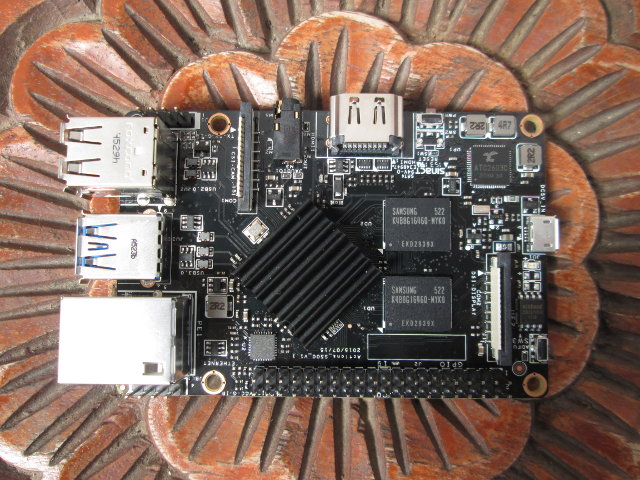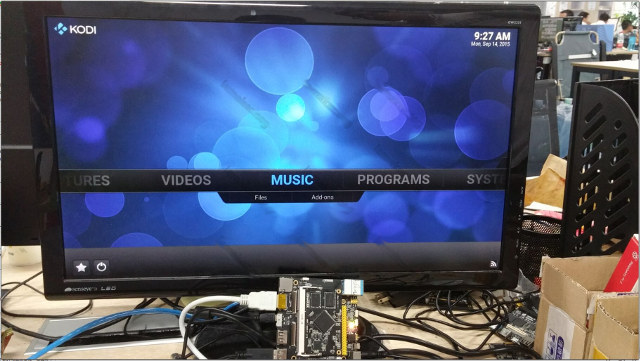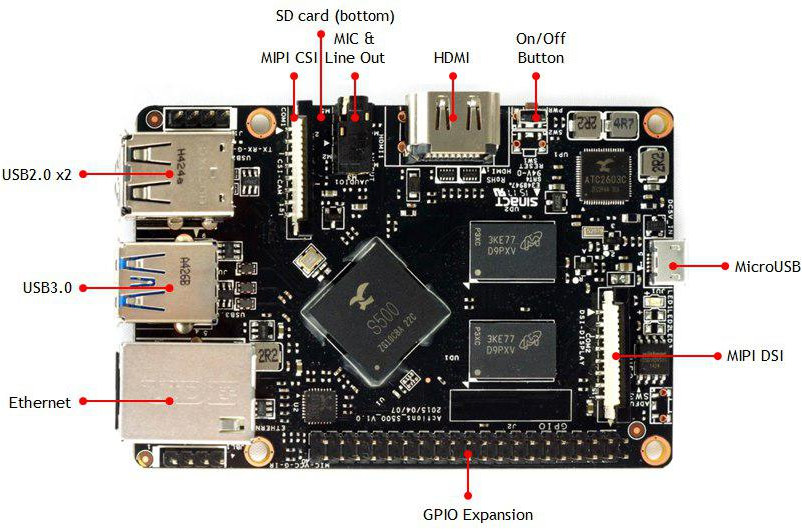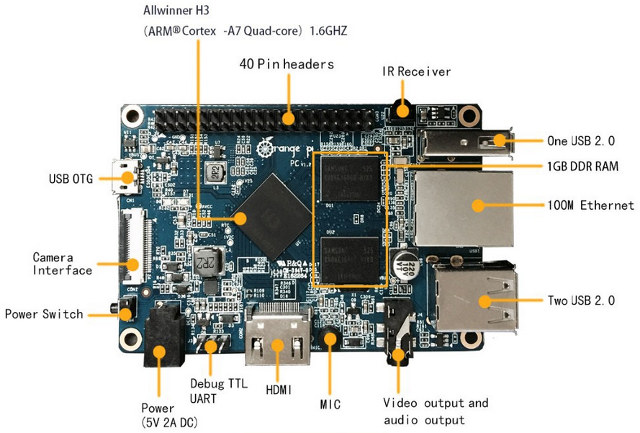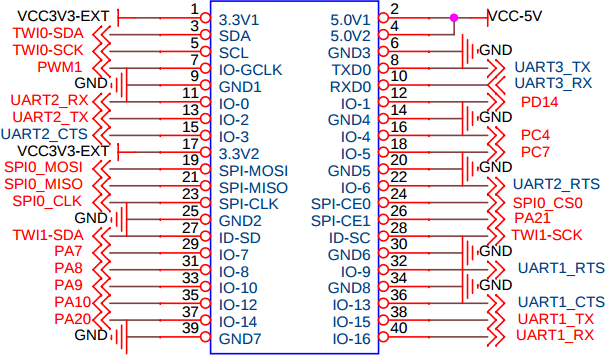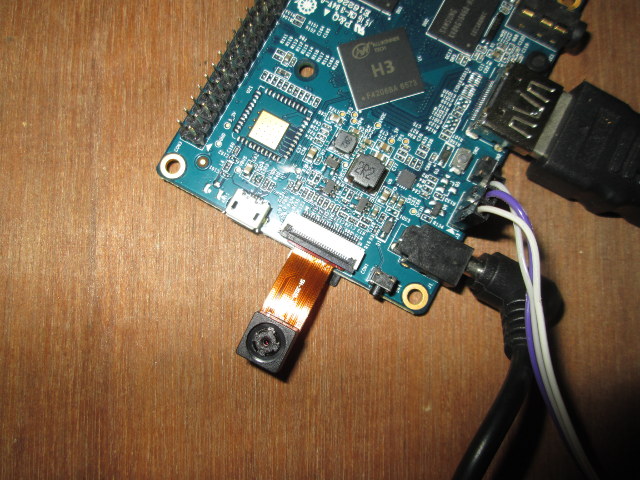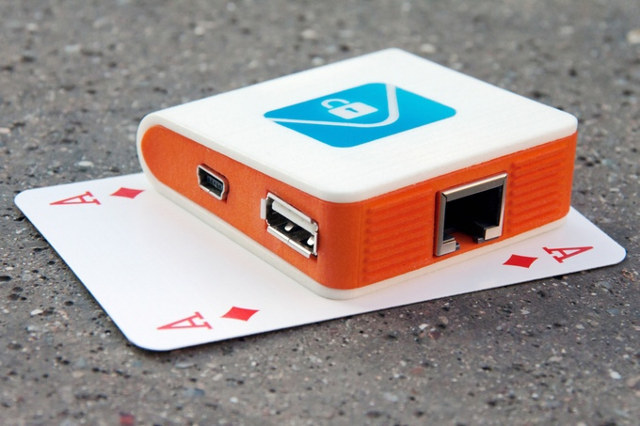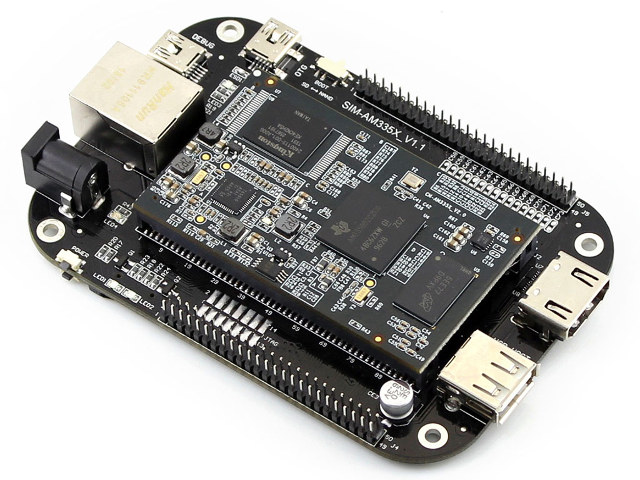Roseapple Pi is a development board powered by Actions Semi S500 processor with 2GB RAM, a USB 3.0 port and more, that is based on Actions Semi Bubblegum-S500 reference design also used by Lemon Pi board. The team behind the project sent me an early sample to try it out. I’ll take some pictures, before explaining how to install and setup Debian 8.1, and how to build and run your own minimal image from source. These instructions should also work for Lemon Pi and LeMaker Guitar boards. Roseapple Pi Photos I received the board in a bubble envelope with a thank you letter, and the board itself in an anti-static bag. No other accessories were provided. Ports, connectors, and headers from top left counter-clockwise: 4-pin UART console, two USB 2.0 ports, one USB 3.0 port, 10/100 Ethernet, a 40-pin Raspberry Pi comptabile header, a MIPI DSI connected, a micro USB […]
LeMedia is a Linux Distribution based on Debian and Kodi 15.2 for Actions Semi S500 Processor
LeMaker has recently released LeMedia, a Linux distribution based on Kodi 15.2 and Debian Jessie for their Guitar board powered by Actions Semi S500 quad core Cortex A9 processor, also found in Lemon Pi, ActDuino-S500 and Roseapple Pi boards. The good news is that H.264 and MPEG4 hardware video decoding is implemented, as well as PowerVR SGX544 GPU 3D acceleration. This is an early version and while IR receiver, WiFi, HDMI and LCD output, and audio are working, the company explained that HDMI support may be flaky, USB 3.0 speed is not optimal, and touchscreen support had to be disabled. They also included a “LeMedia Settings” in the image to have a similar experience as “RaspBMC Settings”. The images for booting from SD card or eMMC can be downloaded here. It’s quite likely they only work on LeMaker Guitar board, and I could not find the Linux 3.10.37 kernel, nor […]
Roseapple Pi Board Powered by Actions Semi S500 Comes with 2GB RAM
[Update: I’ve finally received an answer: Lemon Pi and RoseapplePi makers are different companies, but they just happen to both use the same Actions Semi S500 reference design, and RoseapplePi is manufactured in Taiwan. The picture above is V1.0 board, but V1.1 will have some modifications] Lemon Pi development board was launched this May via a Indiegogo campaign. The board, based Actions Semi S500 quad core Cortex A9 processor, got fully funded by over 200 backers, but at the time of launch, some people questioned the used of the word “Lemon” in a product name, as it has several pejorative meanings, including “something that is useless or crappy”. I was contacted about a new Roseapple Pi board yesterday, and upon checking out the details, it looks exactly like the Lemon Pi, except it got upgraded to 2GB RAM, just like in Indiegogo… The board name on the PCB also reads […]
Orange Pi PC Not Booting? You Are Not Alone…
Orange Pi PC development board launched at the end of August, and quickly went viral thanks to low $15 price tag. The company, Shenzhen Xunlong Software, is fairly small, with just over 10 employees, so when they started getting several thousands customers in a short time, they may have been overwhelmed, and this likely resulted in delays with regards to shipping, and acceptance into Orange Pi forums. Several people have now received their boards, and while many found it to work fine, I’ve been informed several people apparently got a non booting device. People on Youtube and Orange Pi Forums also complained about a booting issue until Ethernet lights up, or Ethernet not working, while other reports Linux is working, but not Android. Unless there was a bad batch during manufacturing, it’s hopefully mostly a firmware issue. The person who reports Ethernet not working, first used the images from Orange […]
Status of Orange Pi Boards GPIO Support
Yesterday, one person asked me to make a video showing GPIO control on Orange Pi 2 mini on YouTube, and since I have just completed a post about Orange Pi camera, I thought it might be fun to check GPIO support too. This post focuses on Allwinner H3 boards, but the instructions and status should be very similar for Allwinner A20 and A31s versions. One of the first things you want before starting playing with GPIOs is the expansion header’s pinout chart, and I could not find any until I had the idea to check for schematics, which are available on Orange Pi resources page. I downloaded the schematics for Orange Pi 2, which should be the same as for Orange Pi 2 mini as the only difference is the lack of WiFi module. Orange Pi PC is a little different, and the schematics are nowhere to be found, but […]
How to Use Orange Pi Camera in Linux (with Motion)
Earlier this month, I wrote a Quick Start Guide for Orange Pi Allwinner H3 boards such as Orange Pi PC, and showed how to install and configure Debian on the boards. I’ve also received the $5.90 Orange Pi camera, which when combined an Orange Pi PC, costs around $27 including shipping. So today, I’ve attached the CSI camera to my Orange Pi 2 mini board, and used it with motion to transform for the board into an IP camera. First, you’ll need to insert the camera into CON1 connector with the camera facing the ceiling, and close the black clip to keep it in place. Now connect all cable and power on your board. First, I studied the steps described on that forum thread, and modified Allwinner configuration files, but after one or two hours, I found out some work at been done since May, and it was now much […]
Own-Mailbox is a Tiny, Secure, and Open Source Hardware Mail Server (Crowdfunding)
Email encryption has been around for a while, but virtually nobody uses it, because it’s quite complex to setup, and your recipients email clients, apps or browsers must also support encryption. Revolutek aims to simplify the setup and usage of encrypted email with their “Own-Mailbox” based on open source hardware and software technology. The hardware solution could have been based on the Raspberry Pi board in theory, but the popular board requires a closed source binary to boot, documentation about part of the hardware is lacking, and once the enclosure, and required accessories are included the price would have been higher. So instead they decided to design their own hardware based on an Allwinner processor: SoC – Allwinner A13 Cortex A8 processor @ 1GHz System Memory – 256 MB RAM Storage – (micro?) SD card slot with 16GB card included Connectivity – 10/100M Ethernet (Lan9500A controller) USB – USB host […]
Marsboard AM335X Development Board Features a TI Sitara AM335x SoM
Haoyu Electronics brought us several Allwinner and Rockchip Marsboard in the past few years, and now they’ve released a version based on Texas Instruments AM335x processor, with a form factor and features similar to the Beaglebone Black, but comprised of a baseboard and system-on-module. Marsboard AM335x board specifications: CM-AM335x System-on-module: SoC – Texas Instrument AM335x (AM3358) ARM Cortex A8 processor @ 1Ghz with SGX530 3D GPU System Memory – 512MB DDR3 SDRAM Storage – 4GB eMMC Flash Connectivity – 10/100M Ethernet PHY (LAN8710A) SoM Connectors – two 50×2 pin headers, 1.27mm pitch Misc – Power Indicator LED Power Management Unit – TPS65910 SIM-AM335X Baseboard Video Output – HDMI type A socket (via TDA19988 LCD to HDMI converter) Storage – mircro SD slot (bottom of the board) Connectivity – RJ45 connector for Fast Ethernet USB – 1x USB 2.0 Host port, 1x micro USB port Debugging – 14-pin JTAG interface (not […]


